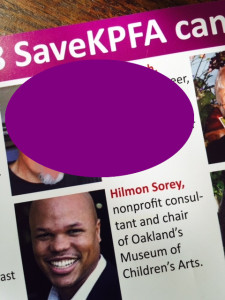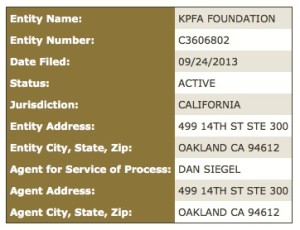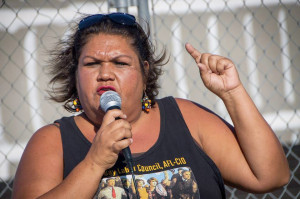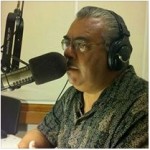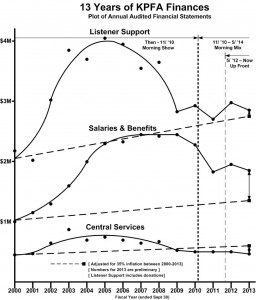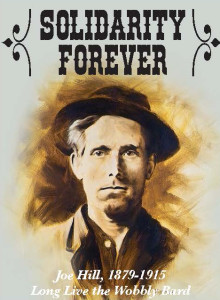 by Bob English
by Bob English
I dreamed I saw Joe Hill last night,
Alive as you or me …
Swedish-American labor organizer, poet and songwriter Joe Hill was executed 100 years ago on Nov 19, 1915. Born Joel Emmanuel Hagglund, Oct 7, 1879, he emigrated to the US in 1902. Working on the West Coast as a migrant laborer in 1910, he joined the Industrial Workers of the World (IWW), the “Wobblies,” a radical union of immigrants (subjected to the anti-immigrant hysteria of that period), founded on the principle of One Big Industrial Union for all workers.
Traveling widely and organizing workers under the IWW, Joe Hill was wildly popular and visible as a speaker, writer of satirical poems, political and union songs (based on tunes of the times), which he performed at IWW strikes and rallies.
Would you have freedom from Wage slavery…
Would you from mis’ry and hunger be free…
Come, all ye workers, from every land,
Come, join in the grand industrial band;
Then we our share of this earth shall demand…
(Rousing Chorus)
There is pow’r, there is pow’r in a band of workingmen,
When they stand, hand in hand,
That’s a pow’r, that’s a pow’r
That must rule in every land—
One Industrial Union Grand!
“There is Power in a Union” 1913 by Joe Hill
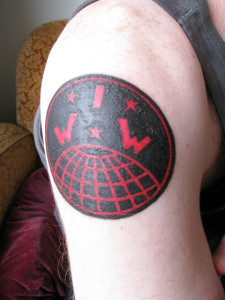
IWW tattoo
This year Joe Hill’s life, last hours and legacy to the labor movement and folk music are honored and narrated in a performance and album of his songs, Joe Hill’s Last Will by singer/songwriter John McCutcheon. The stage play, written by Si Kahn, was first performed in Sebastopol, California 2011.
“Hill channeled his experiences into songs, the first written for the American working class. Those songs helped galvanize the union movement, specifically the IWW, whose activism triggered violent opposition from the wealthy class we now refer to as the ‘1 percent’” (from the show announcement).
As such, he was targeted by the 1% capitalists, particularly the “copper bosses” of Silver King mine, Park City Utah where he was arrested for murder in 1914, framed and convicted. The unjust trial and capital punishment sentence were challenged by a prominent clemency campaign and generated international media attention, union and public protest. In the stage narration of his last hours in jail before his execution at dawn, Hill thought few would remember his life and work.
(Written in his cell, on the eve of his execution)
My will is easy to decide,
For there is nothing to divide.
My kind don’t need to fuss and moan —
“Moss does not cling to a rolling stone.”
My body? Ah, if I could choose,
I would to ashes it reduce,
And let the merry breezes blow
My dust to where some flowers grow.
Perhaps some fading flower then
Would come to life and bloom again.
This is my last and final will.
Good luck to all of you.
“Joe Hill’s Last Will” (lyrics by Joe Hill, music by John McCutcheon)

IWW sticker, 1910s, courtesy Wikipedia
100 years later Joe Hill is one of, if not the most renowned, beloved and inspiring labor leaders of the 20th century. In this century, he stands Presente! with farm workers and the lowest paid, marginalized, unorganized workers; rank and file members fighting for democratic unions, today’s still militant IWW and International Longshore and Warehouse Union (ILWU).
In October 1960 in Sydney, Australia, the great Paul Robeson performed a powerful rendition of “Joe Hill” to construction workers at the site of the future Sydney Opera House.
Says I, “But Joe, you’re 100 [ten] years dead,”
“I never died,” says he.
And standing there as big as life
And smiling with his eyes
Says Joe, “What they forgot to kill
Went on to organize.
Where working people [men] are out on strike
Joe Hill is at their side
From San Diego up to Maine,
In every mine and mill –
Where working people [men] defend their rights
It’s there you’ll find Joe Hill.
I dreamed I saw Joe Hill last night,
Alive as you or me
Says I, “But Joe, you’re 100 [ten] years dead”,
“I never died,” says he.
“Joe Hill” 1930 by Alfred Hayes [updated for centenary]
Through his progressive songwriting a century ago, Joe Hill articulated and transmitted still current issues of immigrant and workers rights, economic and class inequality, feminism, religion and war. “Casey Jones–The Union Scab,” “The Preacher and the Slave,” “The Tramp,” “The Rebel Girl” and “There is Power in a Union” are folk and union standards.
Critically, Joe Hill inspired the great Woody Guthrie, a primary influence for modern singer/songwriters, including Bob Dylan, Pete Seeger, Huddie Ledbetter (Leadbelly), Phil Ochs, Billy Bragg, ani difranco – and Utah Phillips, who (before McCutcheon) had reintroduced Hill and his music. Their recordings, progressive commentary and connection to Joe Hill are featured in music programs on community radio KPFA 94.1 FM, especially Robbie Osman’s “Across the Great Divide,” now hosted by Kevin Vance Sunday mornings.
Further, the IWW/Joe Hill industrial union model, objectives and vision are central to understanding current issues, dynamics and effectiveness of labor organizing, after a long period of steadily declining, sporadically resurgent union membership and power. As we learn from John McCutcheon’s performance, Joe Hill and IWW regarded exclusive craft/trade unions as self-serving job trusts, often acting as “scab” unions. They would have a similar assessment of the larger, growing but often management friendly, hierarchical, bureaucratic, staff-run business unions representing service workers and public employees, notably Service Workers International (SEIU).
Currently, there are struggles throughout the labor movement (e.g. National Union of Healthcare Workers defection from SEIU/United Healthcare Workers) for more democratic, “member driven,” inclusive unions, fighting for the interests and benefits of all workers, ready to take on (not accommodate, deal or collaborate with) management, the corporate-governmental complex, political machines and power structures.
These differences and conflicts between industrial and craft or business unions, their effects in terms of representing, including or excluding workers, are analyzed in an upcoming, related article, reviewing recent history and politics of Pacifica-KPFA community radio unions, a complex, controversial and well-documented subject.
———————-
Bob English, from a working class, union family; retired civil service worker, labor democracy activist formerly with SEIU L790 and Public Employees for a Democratic Union; community radio activist formerly with listener groups Coalition for a democratic Pacifica and Peoples Radio.
———————-
Thanks to Eszter Freeman, Attila Nagy (Sonoma Peace Press), Adrienne Lauby (UCR website), Isis Feral and Stan Woods for review/suggestions, editing, images, production; my son Austin and wife Linda Hewitt for review, encouragement and support completing the work; John McCutcheon, and Dr. Barbara Hodges for inviting us to his inspiring performance of “Joe Hill’s Last Will” at the Palms Playhouse in Winters, California, June 5, 2015.
———————-
Graphics:
Joe Hill Poster
IWW Tattoo by vonlampard license
IWW sticker 191os
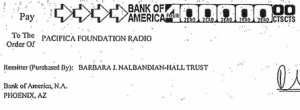
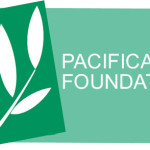 And, even assuming there was ambiguity in the identification of Pacifica Foundation Radio, the proper response would have been to contact the PNB to mutually discuss and decide how to deal with the bequest. It was our opponents failure to ask Pacifica that is at the heart of this matter. To the extent that our opponents felt there *was* ambiguity, they should have checked with the Pacifica National Board.
And, even assuming there was ambiguity in the identification of Pacifica Foundation Radio, the proper response would have been to contact the PNB to mutually discuss and decide how to deal with the bequest. It was our opponents failure to ask Pacifica that is at the heart of this matter. To the extent that our opponents felt there *was* ambiguity, they should have checked with the Pacifica National Board.





